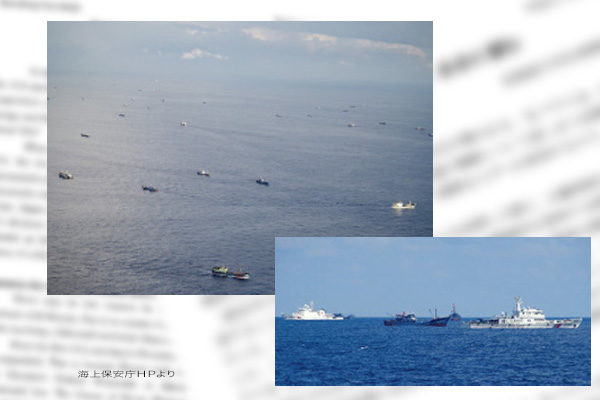Since early March when 220 Chinese fishing boats appeared in the vicinity of the South China Sea’s Whitsun Reef on which the Philippines claims jurisdiction, some of the ships still have moored there in an apparent bid to establish China’s effective control of the area. The Philippines has scrambled for maintaining sovereignty on the reef, seeking U.S. help. But it has failed to take any effective countermeasure in the face of Chinese pressure backed by Beijing’s economic assistance and vaccine diplomacy.
China has also sent fleets of fishing boats with militia on board to waters near Japan. The fleet strategy is so tricky that the Japanese government has been tossed about helplessly.
Chinese fishing boats’ stay seen in Nagasaki
In a remarkable case, 106 Chinese fishing boats intruded into the Tamanoura Bay of Fukue Island, one of the Goto Islands in Nagasaki Prefecture, western Japan, in July 2012. They entered the bay for an ostensible purpose of emergency evacuation from a typhoon and quickly occupied the sea surface. They stayed there for a week. Given that Fukue Island is more than 100 kilometers from the Japan-China fishing boundary line, it was hard to assume that Chinese boats went there for emergency evacuation. In the summer of the year, A Chinese fishing fleet of around a hundred boats occupied the Tamanoura Bay three times. Some 2,000 maritime militia were thought to be on board.
The Tamanoura area has been depopulated, with many households maintained only by the elderly. With fishing boats’ lights brightly reflected on the sea surface at nighttime, residents were too nervous to sleep. Dealing with the Chinese fishing fleet were a patrol ship of the Japan Coast Guard and a fishery patrol vessel of the Fisheries Agency. Only one police officer was in charge of the Tamanoura community. The number of support police officers mobilized by the Nagasaki Prefecture Police Department was limited to around 20. If the Chinese land on the island, the current security arrangements will fail to respond.
China at that time intended to warn against actions by then Tokyo Governor Shintaro Ishihara who had planned to utilize the Senkaku Islands in Okinawa Prefecture. Thus, they exerted pressure on the Japanese government by sending the boats. China has taken every chance since then to send fishing fleets to waters near Japan, continuing to intimidate the Japanese government. So far, Chinese fishing fleets ravaged waters near the Senkaku Islands, the Ogasawara Islands, and the Yamato Bank in the Sea of Japan, jeopardizing local fishermen’s life.
Japanese government’s ostrich policy
On every such occasion, the Japanese government, while recognizing China’s real intension of maritime advancement, simply urged Chinese fishing fleets to leave Japanese waters, effectively acquiescing to their actions. Such ostrich policy or the avoidance of facing problems has invited China to threaten Japan’s sovereignty on the Senkakus, exacerbating the confrontation between the two countries.
Shintaro Abe, former Prime Minister Shinzo Abe’ father, who was highly esteemed for his diplomatic skill as foreign minister, once said principles must be honored for the future in diplomacy. The government must exclude forces threatening Japan’s territory for the sake of Japan’s dignity in order to protect peace and stable life of its people. As a maritime nation, Japan needs above all principle-based diplomacy to protect the sea for the people. Any government failing to demonstrate its will to protect its people and take actions will lose trust from the international community as well as from its own people. I hope that Prime Minister Yoshihide Suga’s administration would implement an effective maritime security policy as early as possible.
Yoshihiko Yamada is a director of the Japan Institute for National Fundamentals and a professor at Tokai University. He is specialized in maritime issues.


